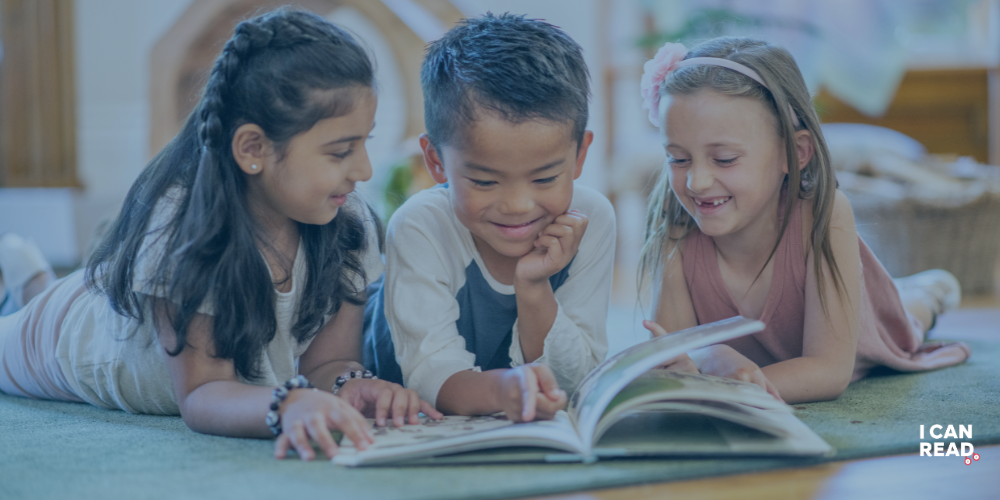
The Importance of Early Literacy Education for Children
by I Can Read Singapore on 30 Dec 2023
Early literacy education refers to children developing reading comprehension, self-expression, and a rich vocabulary at a young age — preschoolers who are read to, often become better readers. Research reveals that 40% of kids with quality learning experiences are likely to become lifelong learners.
This article discusses the importance of early literacy education for children in Singapore.
A. Benefits of Early Literacy Development
Early literacy development has academic, linguistic, and cognitive benefits for children in Singapore.
Academic Benefits:
Improved Academic Performance: Early literacy development helps children develop reading and comprehension skills to perform in all subjects.
Better Writing Skills: Learning to tell a story and structure sentences early helps children develop writing skills.
Cultivation of Learning Habit: Exposing children to literacy and reading early aids their love for learning. It could become a lifetime habit, leading to long-term academic success.
Linguistic Benefits:
Strong Vocabulary and Phonemic Awareness: Reading enriches children’s vocabulary by exposing them to various words. It helps their phonemic awareness.
Language Proficiency: Early literacy development improves language skills. Children who read regularly tend to develop strong language proficiency.
Enhanced Communication Skills: Exposure to different texts helps children learn a variety of communication tones and styles.
Cognitive Benefits:
Brain Development: Early literacy and language development stimulate brain activity, especially with comprehension and language processing.
Improved Memory: Engaging with language-rich activities and reading improves children’s cognitive skills and memory retention. They remember storylines, phrases, and words.
Problem-Solving Skills: Children who are exposed to a variety of book genres and different narratives can develop critical thinking and analytical skills. They analyze the reasons behind the characters’ decisions, which improves their problem-solving abilities.
B. Critical Periods for Language Acquisition
Identifying optimal periods when children are most receptive to language input is crucial for nurturing and enhancing their language skills. Recognizing these as windows of opportunity provides a strategic approach to fostering the development and enrichment of children's language abilities. Some of them include the following:
Early Infancy (0-6 years):
Early infancy is a crucial stage of language development because infants recognize their native language patterns and sounds. It’s the first few months of their lives, and exposure to a variety of languages improves their ability to differentiate phonetic nuances and sounds.
Preschool Years (3-6 years):
Preschool years are periods when children rapidly expand their sentence structures and vocabulary because their brains are receptive to understanding more complex language and grammar rules. Exposure to language and vocabulary models becomes their solid linguistic foundation for development.
Primary School Years (7-12 years):
Primary school is another critical period where children master language and pronunciation fluency. Also, they can effectively learn new dialects and accents during these years.
C. Long-term Impact on Academic Success
Early exposure to reading shapes the long-term academic success of children in Singapore. Here’s how:
Language Proficiency:
Children get exposed to rich, diverse terminologies through reading, and those who engage extensively from a young age often use a large variety of words. Fluent readers also grasp information quickly, which aids their comprehension across subjects.
Cognitive Skills:
Early literacy development encourages critical thinking, and children learn to analyze contexts, characters, and plots and then transfer the skills to subjects like the sciences and mathematics that require analytical thinking. Readers also absorb problem-solving techniques subconsciously, which is valuable for their academic progress.
Academic Confidence:
Proficient readers understand complex texts better, making them more comfortable and confident in class discussions. It enhances their confidence and grasp of topics.
Social and Emotional Intelligence:
Reading cultural narratives that foster understanding and empathy is crucial in social studies. Characters’ experiences in stories help children understand emotions, which is valuable for personal development and social interactions.
Exam Preparation:
Tests have reading comprehension sections, and excellent readers excel in these segments. Also, exposure to texts written by experts improves writing skills, which shapes long-term academic success.
D. Promoting a Love for Reading from an Early Age
Instilling a love for reading in children is essential to fostering a solid literacy foundation. Below are strategies for Singapore-based parents to help their children reap its positive impact:
Create a Reading-Friendly Environment:
Having different age-appropriate books at home is a crucial way to start. A dedicated reading corner or bookshelf can make books easily accessible, and establishing a daily reading routine can have a substantial positive impact.
Be a Reading Role Model:
Children often emulate their parents, so letting them see you read magazines, newspapers, or books regularly could instill a passion for acquiring new knowledge and exploring different worlds through books. You can also read together to share experiences, which makes the process even more enjoyable.
Explore Diverse Genres:
Another strategy is allowing children to select what to read based on their interests. Consider offering a mix of comics, non-fiction, or fiction and introduce books from different cultures to broaden their perspectives.
Interactive Reading:
Encouraging children to discuss characters’ emotions, predict outcomes, and ask questions can also improve their reading passion. Active engagement improves interest and comprehension.
Utilise Technology:
Use literacy apps and interactive e-books that provide a multitude of reading experiences. Consider listening to audiobooks at home or during car rides with children, as it enhances their listening skills.
